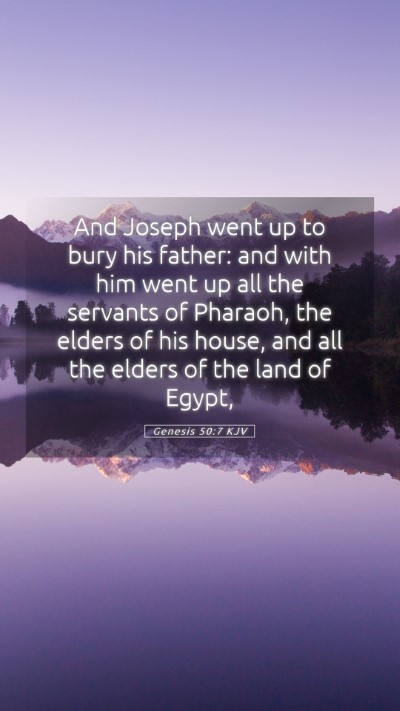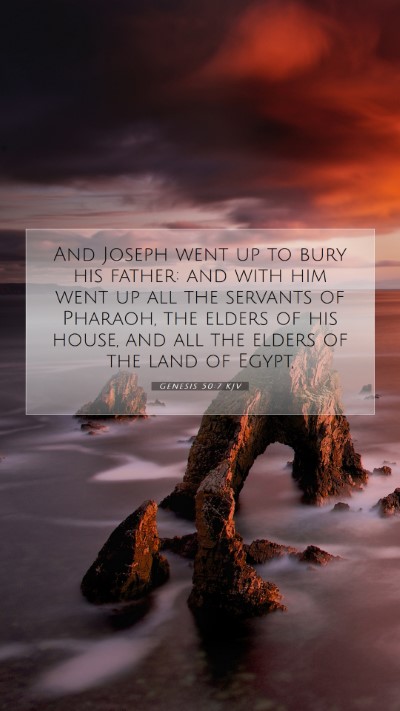Understanding Genesis 50:7
Genesis 50:7 states, “So Joseph went to bury his father; and with him went all the servants of Pharaoh, the elders of his house, and all the elders of the land of Egypt.” This verse marks a significant moment of mourning and farewell, encapsulating themes of family loyalty, respect for the dead, and the cultural practices of burial in ancient times.
Context of Genesis 50:7
In the concluding chapter of Genesis, we see Joseph fulfilling his duty to care for his father Jacob after his death. This poignant moment reflects the deep relational ties within the family and highlights Joseph's esteemed position in Egypt. The presence of Pharaoh's servants and elders signifies the high regard in which Joseph was held, as his father's burial became a national event, echoing the importance of familial and social structures in biblical times.
Commentary Insights
- Matthew Henry: Henry emphasizes the dignity of Joseph as he honors his father, showcasing that true nobility is found in humility and respect for one's parents. The involvement of Pharaoh’s servants indicates the impact of Jacob’s death on the broader Egyptian society.
- Albert Barnes: Barnes notes that the journey to Canaan for the burial exhibits Joseph's commitment to his heritage, underscoring how he balances his Egyptian identity with his Hebrew roots. This act illustrates the importance of remembering one's origins and family.
- Adam Clarke: Clarke offers a historical perspective, comparing Joseph's situation to the customs of neighboring cultures, suggesting that Joseph’s act fulfills the cultural and religious obligations pertaining to burial rites among the Hebrews. He highlights the unity and cooperation among different social strata.
Key Themes in Genesis 50:7
Several themes emerge from the interpretation of this verse:
- Family Loyalty: Joseph’s actions illustrate the value placed on family ties and support even amidst high social status.
- Respect for the Dead: The elaborate funeral processions symbolize the profound level of respect and honor given to deceased family members, which was a common theme in scripture.
- National Unity: The involvement of Egyptian elders indicates how significant events transcended ethnic lines, showing the unity that can arise from shared experiences of grief.
Applications of Genesis 50:7
This verse holds relevance in our lives today, offering insights on how we perceive family and responsibility:
- Continuous Support: Like Joseph, we are called to support our families, especially during times of loss or hardship.
- Respect for Traditions: Upholding family traditions and rituals can be a way of honoring our heritage and maintaining connections across generations.
- Community Solidarity: The presence of a community during mourning reflects the importance of coming together in support of those who are grieving.
Related Scripture References
- Genesis 47:29-31 - The dying wishes of Jacob.
- Ecclesiastes 3:1-4 - The value of mourning in the cycle of life.
- Matthew 22:37-39 - The command to love one another as a reflection of familial bonds.
Conclusion
The exploration of Genesis 50:7 is not just a narrative of Joseph's respect for his father but also a profound reflection on the universal themes of love, duty, and cultural customs surrounding death. Through the lens of biblical commentary, we gain a deeper understanding of how these ancient practices can inform our contemporary lives and relationships.
Further Study
For those engaged in Bible study groups or seeking Bible study resources, this verse serves as an excellent discussion point for examining the balance between personal identity and family loyalty in Scripture.


